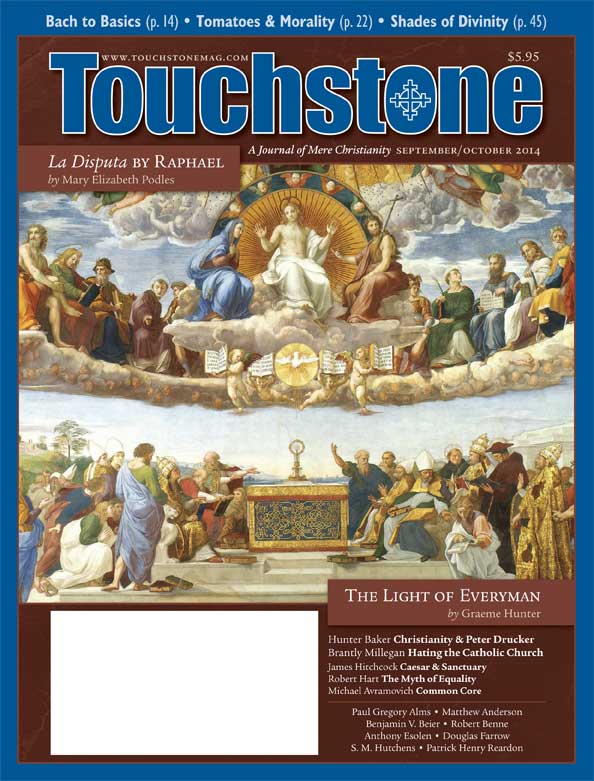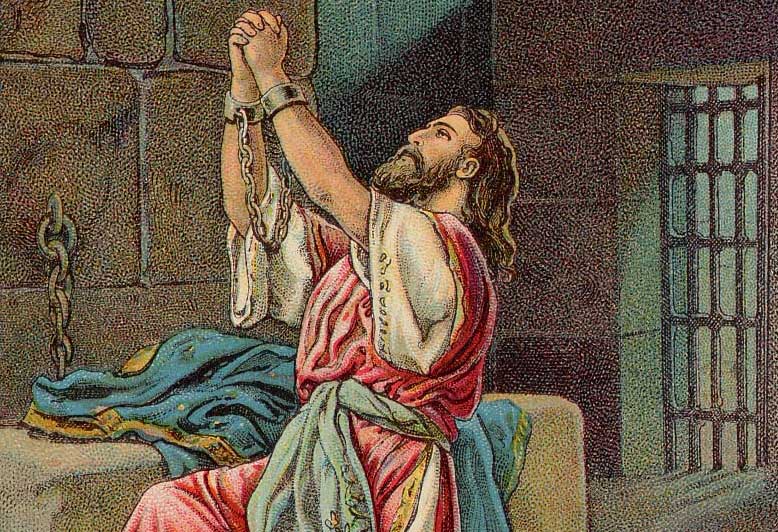View
Thou Shalt Now Covet
Robert Hart on Spiritual Evolution & the Myth of Equal Rights
I did not know the man I was drinking tea with in the parish hall below my office. He had introduced himself as a retired Episcopal priest a few days before, when he'd called for this appointment. He told me then that he was offering something called "coaching," and was asking for referrals from local clergy. At the time of the call I had thought he was running some sort of sports team, but now, over tea, he was telling me what he meant by the word "coaching."
"We ask five power questions to help people change their lives," he told me (I cannot remember even one of those power questions). "This helps individuals grow and follow the leading of the Holy Spirit and recognize his working in their lives."
"So far so good," I thought to myself. "At least up until now he has said things I cannot fault." Still, something felt wrong. And then he told me what coaching had done for him.
"It helped me evolve," he said with a wide smile. Since he appeared to be an average homo sapiens, I awaited an explanation. "Why, just last week I drove up to Maryland and did my first ever same-sex wedding."
"That's because you evolved?"
"I believe the Holy Spirit evolves us." His grin was not one whit diminished.
"I would never even consider such a thing," I said, looking him square in the face. "I don't see that as evolving, but as backsliding. You have fallen away from Christ. I will not be referring any of my parishioners to you for any sort of guidance, or 'coaching.'"
His grin disappeared, and he looked shocked. "I think that's a harsh judgment for you to make," he said.
"I have made no judgment; I have simply remained faithful to what was revealed in the Scriptures long ago," I told him. Our conversation was substantially over at that point, and within a few minutes I was rinsing out two cups, while he was in his car, driving down our long wooded driveway to the road.

A New Definition of Equal Rights
Indeed, I had made no judgment. It was he who had judged the entire understanding of the Apostolic Church to have been in error for two millennia, in keeping with the new Canon Law of his denomination. Before leaving, he assured me, weakly, of his own love for the Scriptures, which only served to assure me that there was no point in discussing with him their plain meaning.
On what basis did he take my simple fidelity as some sort of harsh judgment? On a theological basis? Indeed no; rather, he took it on the basis of a strange new twist in modern egalitarianism, one that has nothing to do with Christian doctrine, and in fact requires turning from it, or in his case and that of his denomination, altering it and blaming that alteration on the evolving work of the Holy Spirit. It requires effort to baptize a purely secular notion.
The new definition of equal rights has been stated over and over again in our culture, and the frequency of that repetition has led to its widespread acceptance, so that, for many, it now takes the place of traditional morality. Even religious people, including many from historic denominations, have accepted that secular notion as a moral imperative, and, being religious, they have taken that false moral imperative quite seriously indeed. After all, morality is the business of religion.
What is the new concept of equal rights that has arisen, then? How does it differ from the traditional sort—so clearly expressed in the Declaration of Independence and guaranteed in the Constitution of the United States—which articulates a right to equal treatment before the law, i.e., that in court no one is preferred for his social standing or any other such accident? When the new concept is applied to a person of sexual deviation, for example, will his lawsuit fail because of his orientation and preference? If such a person is charged with a crime, is he presumed guilty, or must the case be proved beyond a reasonable doubt? In short, does such a person still have legal rights that are the same as everyone else's? Of course he does, and such an understanding of equal rights has the full weight of jurisprudence behind it.
Covetousness as a Right
The new definition of equal rights is something altogether different, and for purposes of religion and morality, it ought to be classified as a violation of God's commandment not to covet anything that belongs to one's neighbor. For this new concept has nothing to do with fair treatment before the law, but rather with being able to obtain something strictly because one's neighbor has it.
The term "marriage equality" is often accompanied by the word "right." Everyone, we are told, has the "right to marry." But when proponents of "marriage equality" insist that two persons of the same sex have the right to marry each other, what they really mean is that, because some opposite-sex couples among their neighbors have the right to a certain property (a recognized legal status), the two persons of the same sex have a right to the same property—but only on their own imposed terms.
Never mind that no one in the entire history of the world has seen that kind of "equality" as a right. I accept that a homosexual person has the same legal rights I have, even the right to marry—a person of the opposite sex, that is (though it may not be advisable). If a homosexual person is charged with a crime or brings a suit into court, his rights are the same as everyone else's, the same as mine. The same goes for his right to free speech, to freedom of religion, not to face double jeopardy, to be protected from improper search and seizure, and so on.
What such a person does not have the right to is equal happiness. As used in the Declaration of Independence, the phrase "the pursuit of happiness" refers to pursuits, that is, to the right to choose for oneself one's own occupation in life (whatever pursuit or occupation would make him happy, at a time when the word "happiness" was less about emotion than about circumstance). But now the phrase has been redefined to mean that if I find happiness with my wife and enjoy certain advantages as a married man, a homosexual person has an equal right to find the same happiness and enjoy the same advantages in a same-sex "marriage." Because one person has a thing, everyone else is entitled to it. But that is not what "equal rights" has ever meant before. Today it is simple covetousness.
If that constitutes a "harsh judgment," then perhaps I am a Cro-Magnon man who refuses to evolve. There may be a new breed of Christian about, but I remain a "miserable offender" who prefers fidelity to the faith once delivered to the saints. •
Robert Hart is rector of St. Benedict's Anglican Catholic Church in Chapel Hill, North Carolina (Anglican Catholic Church Original Province). He also contributes regularly to the blog The Continuum. He is a contributing editor of Touchstone.
subscription options
Order
Print/Online Subscription

Get six issues (one year) of Touchstone PLUS full online access including pdf downloads for only $39.95. That's only $3.34 per month!
Order
Online Only
Subscription

Get a one-year full-access subscription to the Touchstone online archives for only $19.95. That's only $1.66 per month!
bulk subscriptions
Order Touchstone subscriptions in bulk and save $10 per sub! Each subscription includes 6 issues of Touchstone plus full online access to touchstonemag.com—including archives, videos, and pdf downloads of recent issues for only $29.95 each! Great for churches or study groups.
Transactions will be processed on a secure server.
more from the online archives
calling all readers
Please Donate
"There are magazines worth reading but few worth saving . . . Touchstone is just such a magazine."
—Alice von Hildebrand
"Here we do not concede one square millimeter of territory to falsehood, folly, contemporary sentimentality, or fashion. We speak the truth, and let God be our judge. . . . Touchstone is the one committedly Christian conservative journal."
—Anthony Esolen, Touchstone senior editor










